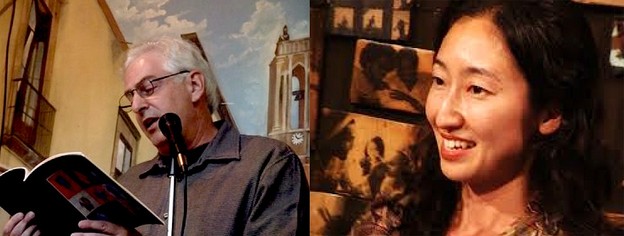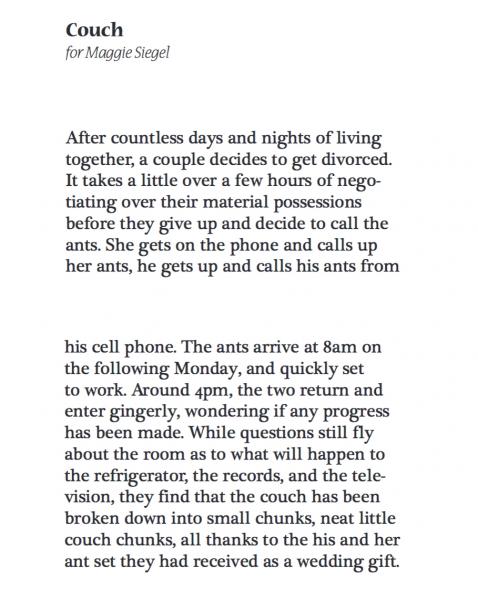
First reading of Sawako Nakayasu's 'Couch' (4)
Hank Lazer

Is a first reading possible? Perhaps a quick reading, or a reading on the fly… Inevitably, even my quick reading has a trail – from learning to read (“sound it out”), to habits learned in school (close reading; theme-based reading; the ongoing baggage of New Criticism), to the informed readings we are expected to practice in essays and reviews. There are plenty of other theoretical, historical, and cultural frameworks that (for me) might become a part of subsequent readings. In this reading, what I mean by a first reading is one that does not reach much beyond my initial impressions and thoughts. Or, another way to think of a first reading is (ideally) a radical empiricism, or a reading that moves in the direction of beginner’s mind.
So, a quick first reading: what strikes me first is the deliberate absurdity of the prose poem’s plot. The prose poem sets up its own logical world, with the ants as the doers, as the ones called upon to solve the divorce difficulties of the unnamed couple – human? something else? It is interesting that what they are is unnamed. The penumbra of the absurd spreads as we read. The first substitution – for lawyer, counselor, relative, friend, advocate – breaks the simple logic of the poem. Until the ants appear — “they give up and decide to call the ants” — all is “normal.” The poem’s language is on flat (standard syntax, standard narration) autopilot until the ants enter, and, oddly, and engagingly, the poem sticks with its simplicity and logic even after so much depends upon the ants. The ants turn out to be good, reliable, dutiful workers. The reverberation of the ants pushes us back to the smallness of the couple’s mutually possessed life, a domestic arrangement which, when disassembled, comes down to how to split up the refrigerator, records, and television. It is a deliberately flattened life – perhaps one actually best suited to the perspective and work of something similarly small such as ants? The specific phrase “her ants” and “his ants” – as in her people and his people – piques my attention, though then the ongoing flatness of the rest of poem does not really deviate from what I’ve already come to anticipate that the poem will do.
A first reading is also a hedonistic reading: do I want more? In this case, not really. It’s not a poem that upon first reading leads me to want to read more. I’ve seen and read these moves enough times before that there’s no real freshness here for me, nothing so compelling as to make me say, “I’ve got to read more of these poems, I’ve got to read more by this person…” By the way, what I’m saying is quite different from determining whether the poem is “good” or “bad”; I don’t really care about such judgments, and I doubt that I know on the basis of reading one poem quickly whether or not it’s “good” or “bad.” When I say a first reading is hedonistic, I mean that an initial reading is a kind of litmus test for whether or not this poem interests me.
If my first reading were prelude to a more substantial reading – as part of an essay or a review – then a whole range of other duties properly enter in: Who is Maggie Siegel (and why might this poem be dedicated to her)? How does “Couch” figure into the complete chapbook itself (is the poem atypical of the overall collection)? Is this kind of absurdist humor and word substitution common throughout the collection? If so, to what ends? In the overall collection, Insect Country, what other appearances for the ants? Is there a Kafkaesque element to the insect world? What are the affinities and kinships of Nakayasu’s prose poems to other prose poems – Edson? Ponge? What’s the possible linkage between “Couch” and fables [fractured or otherwise]? I’d also want to learn more about the poet, Sawako Nakayasu, and the context for this particular piece of writing… I would also want to learn something about the publisher/press and how Nakayasu’s work is a part of that broader endeavor. Etc. And these kinds of additional readings/investigations might indeed alter substantially my engagement with and interest in the poem.
So a first reading is a kind of scouting party activity, like reading in a magazine/journal one or two poems by a poet one is unfamiliar with. A first reading may also constitute a test of sorts: is this a piece of writing that will re-pay sustained and repeated reading? In some sense, a first reading is an initial investment – of time, interest, curiosity, inquiry – which somewhat implicitly asks about future investments. Though, of course, first readings are also much more aimless and less calculating than this metaphor suggests, and pointless, random reading – in magazines, online, in bookstores – is a pleasure in and of itself and an important way to resist the over-professionalization of reading/responding and the over-organization of reading (for a purpose).

Hank Lazer has published fourteen books of poetry since 1992. Over the last decade, Lazer has given poetry readings and lectures at Stanford, Notre Dame, Princeton, Harvard, University of Virginia, Tulane, Columbia, Huntingdon College, the University of California at San Diego, SUNY-Buffalo, Temple, Talladega College, Walt Whitman Arts Center, the San Francisco Conservatory of Music, the University of Southern California, the Modern Languages Association convention, the Associate Writing Programs conference, and the University of South Alabama. Samples of Lazer’s work can be found at The Electronic Poetry Center (http://epc.buffalo.edu) and PennSound (www.writing.upenn.edu/pennsound). In addition to his poetry, Lazer is a noted critic of modern and contemporary poetry. In 1996, Northwestern University Press published Opposing Poetries, a two volume collection (Volume 1: Issues and Institutions and Volume 2: Readings) of Lazer’s essays on contemporary poetry. For over a decade, his essays on innovative poetry, new modes of lyricism, and representations of spiritual experience have appeared in a variety of journals, including Facture, The Boston Review, Jacket, American Poetry Review, and Talisman. In 2008, Omnidawn published Lyric & Spirit: Selected Essays, 1996-2008. Lazer’s work has been nominated for the 2005 Pulitzer Prize and the 2004 Forward Prize, and won the 2003 Emily Clark Balch Prize for Poetry from the Virginia Quarterly Review.